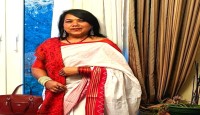Pamelia Riviere
As a passionate proponent of peace, I firmly believe in the paramount importance of approaching a wide array of societal and global issues with profound compassion, deep empathy, and meticulous, thoughtful consideration. It is essential to delicately navigate the intricacies of complex topics with unyielding openness, profound empathy, and a genuine spirit of understanding to cultivate a harmonious, inclusive environment that nurtures peace and unity.
I strive to approach each issue with a balanced perspective, acknowledging that my views may be seen as both lenient and overly critical. My goal is to thoroughly analyze each situation without jeopardizing our relationships and the harmony of our society.
The diverse political parties within the Bangladeshi community, such as the Awami League (AL), Bangladesh Nationalist Party (BNP), Jamaat-e-Islami (Jamat), and Hefazat-e-Islam (Hefazot), each bring a unique set of values, perspectives, and policies to the table. It's important to recognize and embrace the positive aspects of each party while also acknowledging and working to address any negative aspects they may have. By doing so, we can strive for constructive dialogue and collaboration within the political landscape of the Bangladeshi community.
In order to maintain peace in society, I firmly stand against the enforcement of the death penalty, even for individuals known as Razakars. This stance is taken despite significant evidence of their atrocious acts against East Pakistanis, which tragically includes members of my own family.
My stance is based on the belief that resorting to the death penalty does not provide the opportunity for individuals to reflect, learn from their mistakes, and potentially make positive contributions to society.
Instead, offering a lifetime sentence provides the chance for repentance and growth. Additionally, it facilitates a sentiment against the use of the death penalty.
By opting for a life sentence, offenders are given the chance to reflect on their actions, seek redemption, and undergo personal development. Additionally, this approach fosters a widespread sentiment against the use of the death penalty, promoting a more humane and empathetic justice system.
At this pivotal moment, Bangladesh faces a critical opportunity to take action and avoid substantial losses. It is imperative to envision a modern Bangladesh that emulates the successes of nations such as Singapore or Korea while actively steering away from the challenges and setbacks experienced by countries like Afghanistan or Pakistan. This strategic approach will set the stage for Bangladesh's future development and social progress.
The Muslim world has much to offer regarding talent and potential, and it can be a strong competitor to the West in advancing social progress. However, the adherence to Shariah law in countries like Iran and Saudi Arabia has posed challenges to the advancement of women's rights. Some advocate for an Islamic Republic based on the laws of Caliph Omar in Bangladesh, but it's important to carefully consider the feasibility of such a system.
In the contemporary global landscape, it is evident that capitalism plays a significant role in shaping economic and social structures. Hence, a careful consideration of liberal capitalism and democratic systems is imperative for the advancement of societies. Imposing religious laws to govern modern society is not feasible, given the diverse and secular nature of the world today. Drawing from my extensive sociology and political science studies, I have gained a profound understanding of the historical evolution of laws and theories that have shaped our world, providing valuable insights into the complex dynamics of governance and social systems.
Therefore, I believe recognizing the dynamic nature of religion and state laws is of utmost importance. It's crucial to understand that laws should evolve over time to reflect the changing needs and values of society. This adaptability is a fundamental aspect of a just and fair legal system. It's worth noting that Islamic laws, in contrast, are traditionally resistant to change and tend to adhere to established interpretations of religious texts. This difference in approach highlights the importance of considering the evolutionary nature of laws and legal systems across different cultural and religious contexts.
While the Bangladesh Interim Government may be considering adopting the Islamic Republic idea, it is crucial to carefully evaluate the potential
implications. Embracing Sharia law in its strictest form could have serious consequences for women's rights. The rigid implementation of Sharia law may result in the imposition of harsh dominance over women, potentially leading to violations of their rights and freedoms. It is important to consider the potential impact on gender equality and women's empowerment before implementing such legislation.
Recognizing and respecting Bangladesh's diverse cultural fabric is crucial. Bangladesh is a country with a rich tapestry of different ethnicities and traditions. The Constitution must not promote divisive ideologies by enshrining the concept of an Islamic Republic. If such an ideology remains, it should be revised to establish Bangladesh as a secular democratic state. Embracing secularism and democracy is vital for fostering inclusivity and social cohesion within the nation.




.jpg)






